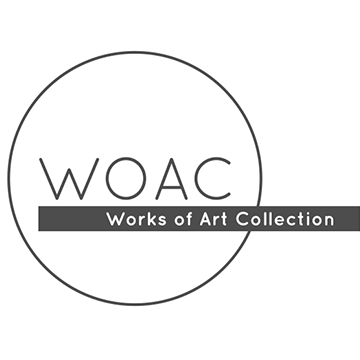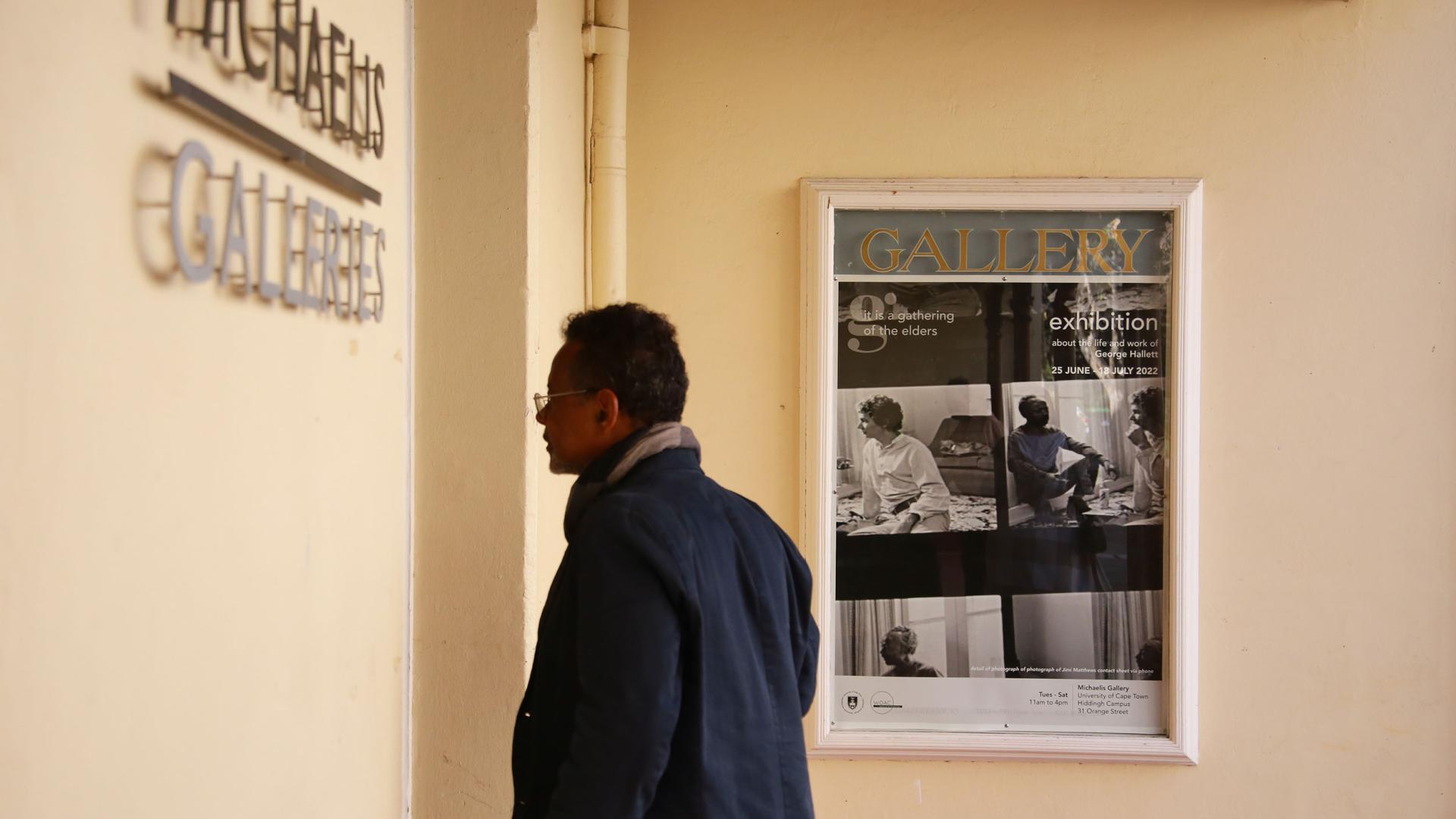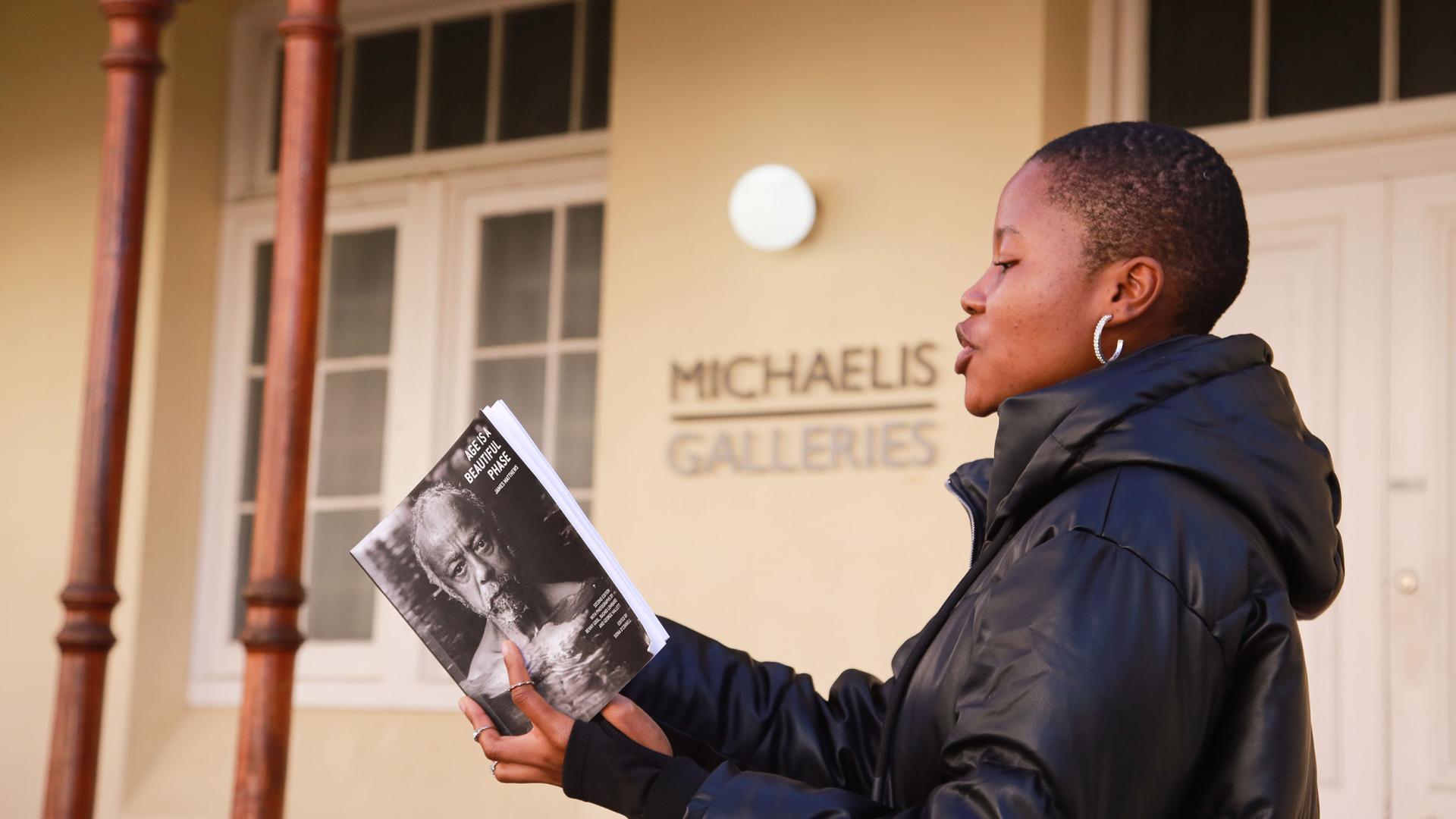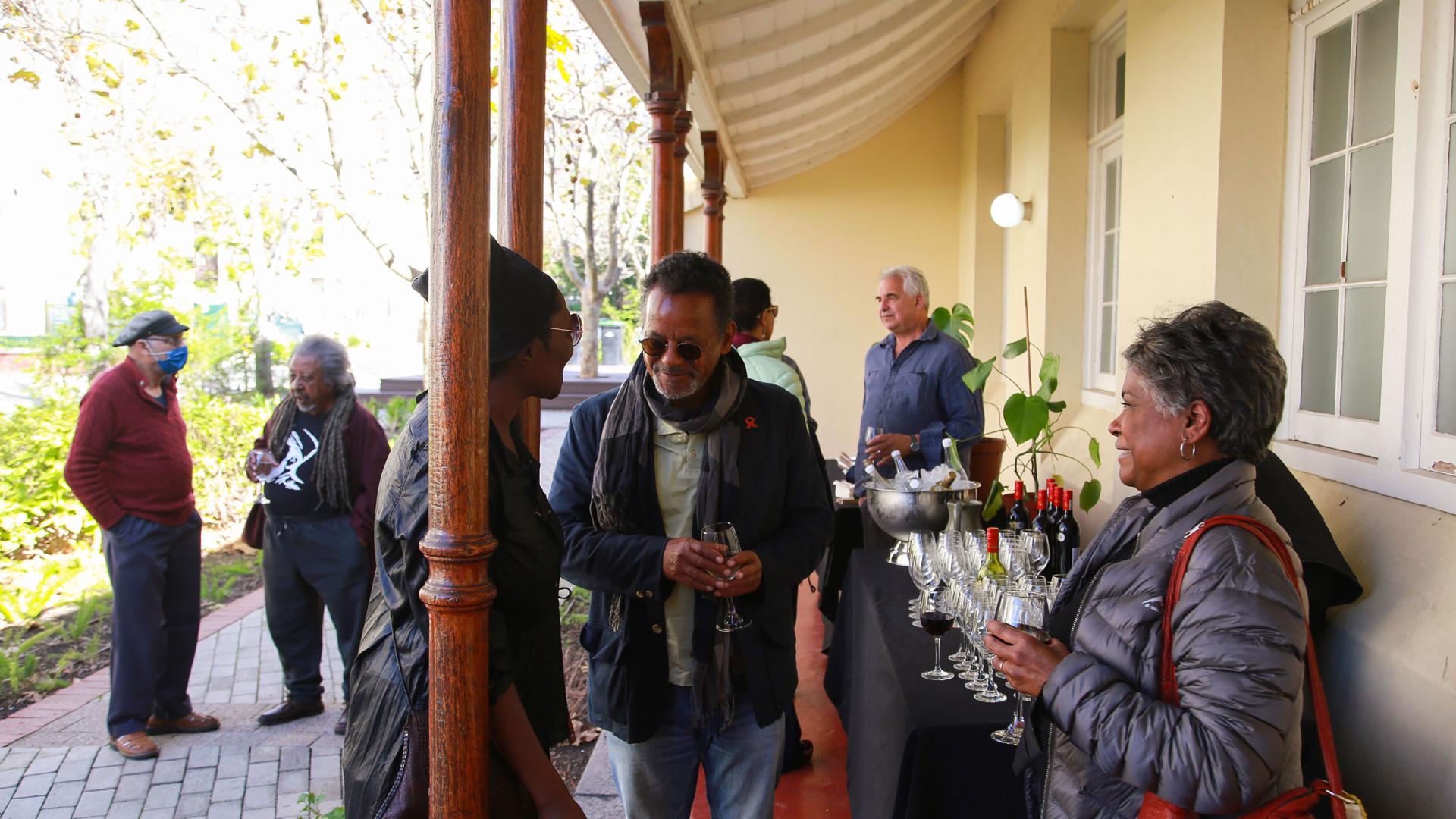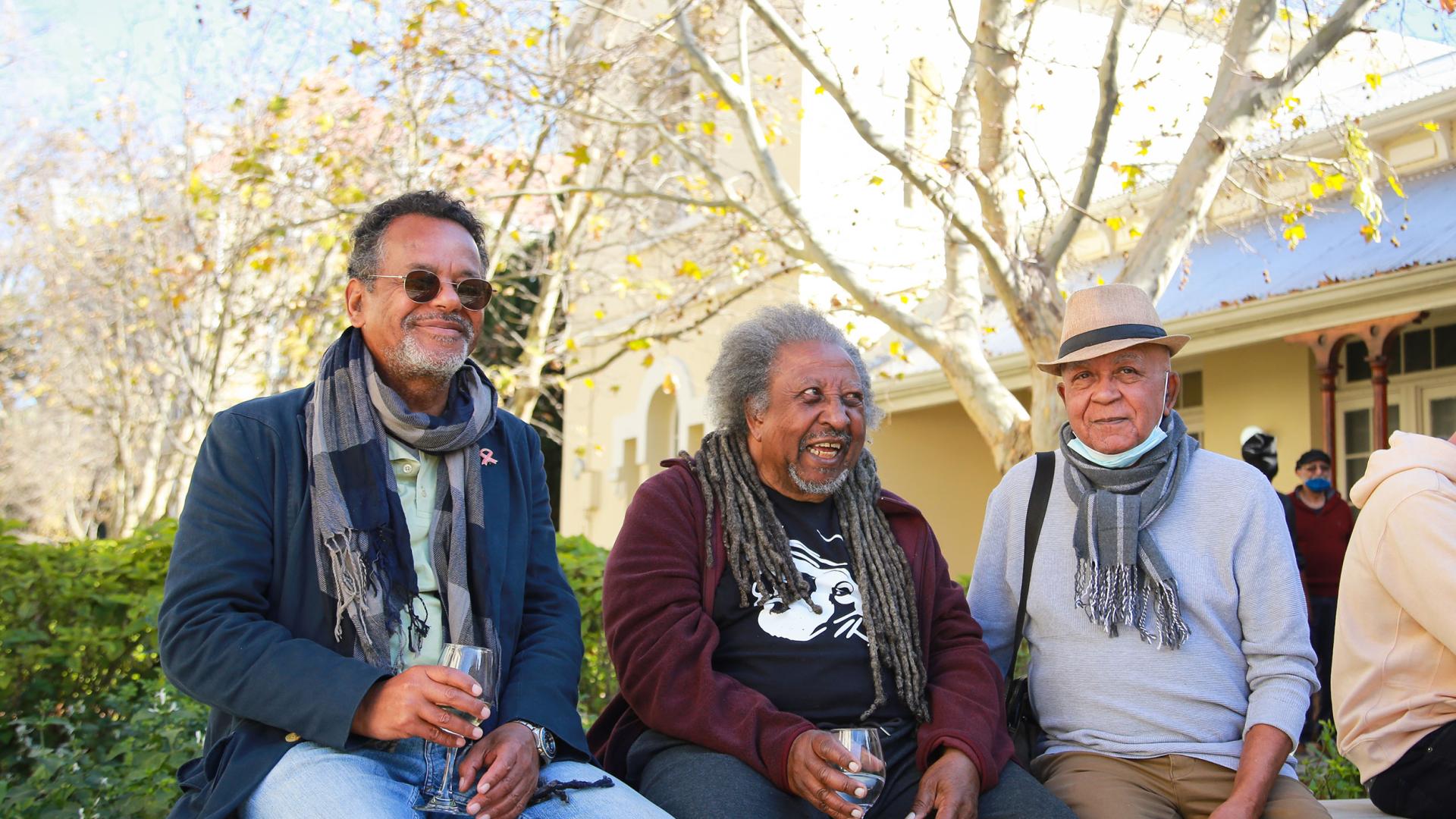it is a gathering of the elders (borrowed from a James Matthews poem*), is a research project based on the life and work of photographer George Hallett. In 2020, the UCT Works of Art Committee acquired seventeen photographs by Hallett, which in this project serve as catalysts to a series of questions relating to artistic production and practice, notions of collaboration, disciplinary and institutional entanglements with photography, and the politics of the archive.
Hallett went into exile in the United Kingdom in 1970, returning to South Africa only after Nelson Mandela’s release. He photographed the country’s first democratic election at the invitation of the African National Congress, as well as proceedings at the Truth and Reconciliation Commission.
Instituted by the UCT’s Works of Art Committee (WOAC), chaired by Associate Professor Nomusa Makhubu (art history), the series is intended to bring Hallett’s work into broader focus. It is coordinated by Iziko Museum’s Ingrid Masondo, photographer, curator and project manager in the arts and heritage sectors, and curator of contemporary art Tšhegofatšo Mabaso, and will bookend the WOAC exhibition of Hallett’s work, which they are curating. Read more in article: Research, exhibit exiled artists’ work lest they become ‘intellectual refugees’
*The poem it is a gathering of the elders is included in the publication Age is a Beautiful Phase by James Matthews, edited by Siona O’Connell and published by Centre for Curating the Archive, 2014.
Texts: Helen Swingler and Mari Stimie
Project components: Conversation series #1 + Conversation series #2 | Exhibition | Background story (article)
Conversation series
Conversation series #1
Eugene Skeef and Lefifi Tladi with Valmont Layne
3 February 2022
In this first conversation of the series, elders Eugene Skeef and Lefifi Tladi, who developed friendships with Hallett during his exile years in London in the 1980s, share their personal reflections on George Hallett. The conversation is guided by researcher-musician-curator Valmont Layne. Watch the video recording below.
About the speakers
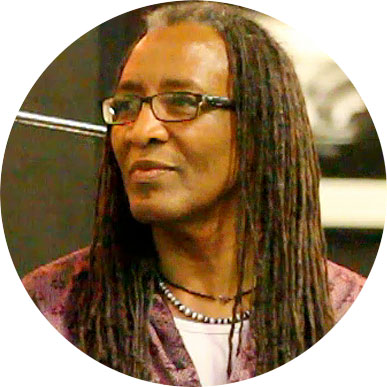
Eugene Skeef is a London-based South African percussionist, composer, poet, educationalist and broadcaster who cut his teeth as an anti-apartheid activist working alongside Steve Biko in the Black Consciousness Movement. He also works in conflict resolution, acts as a consultant on cultural development and teaches creative leadership. Eugene has made his mark on the British cultural scene through his innovative, creative projects that straddle a broad spectrum of art forms, including community music, jazz, 'world' music, European classical music, contemporary dance theatre and children's storytelling.
Eugene has composed for major orchestras like the London Philharmonic Orchestra (LPO), the London Sinfonietta and the Royal Scottish National Orchestra, training their players and helping to set up their education departments. In 2005 Eugene performed with his Abantu Ensemble at Buckingham Palace and was presented to the Queen as part of the historic Music Day to celebrate the diversity of culture in Britain. In June 2008, Eugene and Richard Bissill's Excite!, an orchestral commission by the LPO, premiered at the Royal Festival Hall at Southbank Centre, London. Eugene has been the Artistic Director of Quartet of Peace, an international project initiated by Brian Lisus, the South African luthier who has made a quartet of string instruments in honour of South Africa's 4 Nobel peace laureates, Dr. Albert Luthuli, Nelson Mandela, Archbishop Desmond Tutu and FW de Klerk. Quartet of Peace uses music to bring about peaceful resolutions to conflict and poverty, with a special focus on young people. In 2010 Eugene's collaborative project The Battle Of The Wordsmiths (with writer Tunde Olatunji and producers Blue Hippo Media) was shortlisted for the PRS New Music Award. Eugene is a Fellow of the Royal Society of Arts.
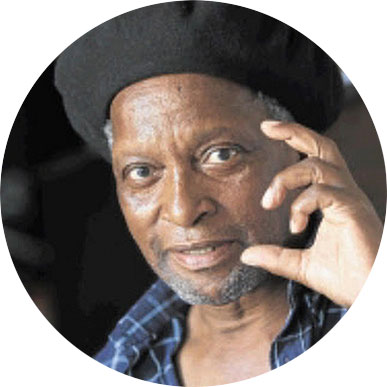
Lefifi Tladi is an artist, poet, and jazz singer. He cofounded Dashiki in 1970, a Jazz music and poetry band which was very functional within the Black Consciousness Movement. He was forced into exile in 1976 in Botswana by the then security police. In 1977 he performed in Nigeria FESTAC Festival with the likes of Dudu Pukwana, Julian Bahula, Louis Moholo, Jonas Gwangwa and many more. In 1983 he performed at the UMIO jazz festival, which led to a release of a CD titled Tribute to Nomazizi (his mother). He worked with a band dubbed the acronym DAST, Daniel-Adolfson-Skotte-Tladi, in making this masterpiece a success. In 1988 Tladi recorded a poetry project which he personally named Poetry for Artvanced Listeners. This was followed by a collaboration with Gilbert Mathews Brus Trio in 1990. He was also featured on the jazz album Ingoma by one of his fellow jazzmen Zim Ngqawana.
Much of Lefifi's artworks have been created in Sweden because this is where Tladi was in exile. In Sweden, Tladi apprenticed under Harvey Cropper, who is a well-known painter who taught another jazz artist, Charlie Parker, how to paint. Tladi received a scholarship to enter Cropper's studio in 1980. Lefifi Tladi's style is described as modernist and African. In 2002 he worked with Tlokwe Sehume, and Naga ya Fya was released. After recording a Jazz and Poetry performance with Malombo Jazz Men at Wits University Great Hall in Johannesburg in 1973, a CD was released in 2005.
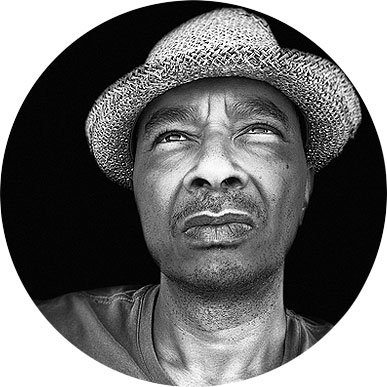
Valmont Layne is a researcher at the Centre for Humanities Research, University of the Western Cape, South Africa. Layne has developed a lifelong interest in critical thinking as the basis for musicianship, activism, advocacy and scholarship in the arts. He has also worked as a university arts administrator, curator, and cultural advocate and played a leading role in the development of the audiovisual collections and curated programmes at the District Six Museum in Cape Town as an archivist and later as its Director. His current research interests include music, sound studies, archives and heritage studies and digital preservation. In 2019 he completed his doctoral thesis titled: Goema's refrain: Sonic anticipation and the musicking Cape.
Conversation series #2
Maymoena Hallett, Gavin Jantjes and Rashid Lombard with Kwezi Rule
5 May 2022
About the speakers
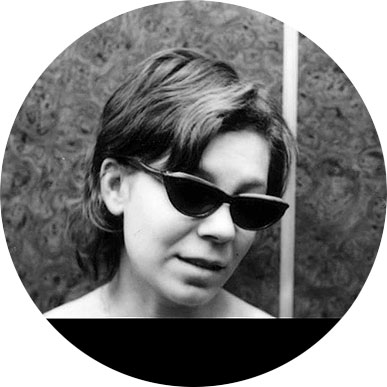
Mymoena Hallett lives in the Pyrénées Orientales region of France, where she was born, with her two sons, after years of living abroad. Settling in Cape Town in the wake of a new democracy in 1995, she studied and then taught first at the University of Cape Town, then in Grahamstown – focusing on Francophone African Literature and French hip hop. While primarily teaching French and English, using language as an empowering tool for refugees, she has also worked as a translator for cultural publications. In 2019, she was part of the Passages Festival team in Metz, France. Her current research explores how culture can bridge gaps and create bridges between countries and continents.
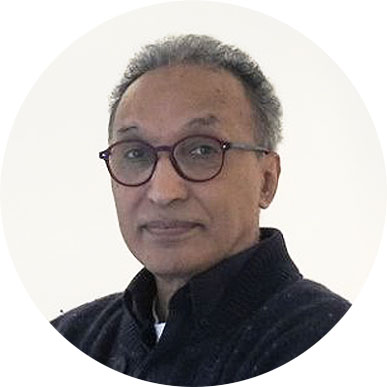
Born in Cape Town, South Africa, Gavin Jantjes has spent a great part of his professional life in exile from apartheid, living and working as an artist, a curator, educator and artistic director in Germany, UK and Norway.
He has exhibited internationally and his paintings and graphic works are in collections that include Tate Gallery, the National Museum of African Art Smithsonian, MoMa New York, Baltimore Museum of Art and the Helios Foundation Palo Alto, US, the South African National Gallery Cape Town, the Hermitage Saint Petersburg, Russia, the Gothenburg Art Museum Sweden, Henie Onstad Art Center Oslo and the National Museum of World Cultures Amsterdam as well as private and corporate collections worldwide. He received numerous commissions from the United Nations Refugee Council and the UN Commission on Apartheid. He served as a trustee of the Tate, Whitechapel and Serpentine Galleries and was called to the Arts Council of Great Britain (today the Arts Council of England), where he structured the Council’s national policy on cultural diversity. He was appointed artistic director of Henie Onstad Art Center (1998–2004) and senior curator for the National Museum in Oslo (2004–2014). He was a member of the finding commission for Documenta 12. Currently, he is an advisor to the Zeitz MOCAA – Museum of Contemporary African Art in Cape Town. He is the author of A Fruitful Incoherence: Dialogues with Artists on Internationalism (1998, Iniva) and he initiated the “Visual Century Project” to produce Visual Century: South African Art in Context 1907–2007, volumes I–IV, (2011, Wits University Press). His writings on contemporary art include catalogue essays for Nicholas Hlobo, Marlene Dumas, David Goldblatt, George Hallett, Carlos Capelån, Susan Hiller, and Marie Jo Lafontaine. He lives and works in Oxfordshire, UK.
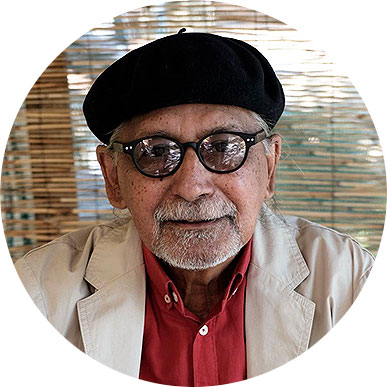
Rashid Lombard, by trade, has worked as International Political and hard-news photojournalist for over 30 years. He now applies his expertise in producing and management of entertainment and entertainers. A former station manager of Fine Music Radio and former programming manager at P4 Smooth Jazz Radio, Rashid produced e-TV's well-received "Jazz Café". With some 20 years' experience managing music concerts and events and as the founder of espAfrika in 1998 and the Festival Director of the Cape Town International Jazz Festival from 2000 to 2014, he has a played a pivotal role in conceptualising, strategising, programming and implementing the International and National marketing strategies for the iconic event now branded as "Africa's Grandest Gathering". In 2014 Rashid received the Presidential Order of Ikhamanga, a South African honour granted by the President of the Republic of South Africa for achievements in arts, culture, literature, music, and journalism.
Rashid is now solely focused on growing his newly established company, Rashid Lombard Inc. (Pty) Ltd, a family business established in 2015. The company speaks to the deployment of the collective skill, network and experience we have in integrating culture into society through sustainable arts and culture design, programming, government relations, training and development, with the main focus on his extensive archive and digitising this heritage resource.
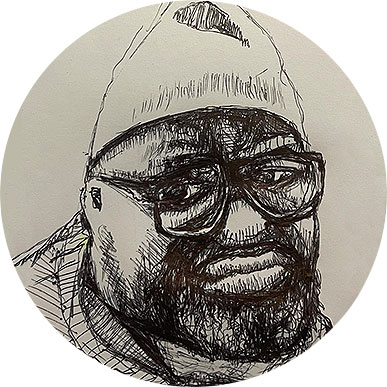
Khwezi Gule is a compulsive doodler by nature. A curator by profession. A writer by necessity. He likes to pretend that he’s interested in quantum field theory, but he’s too lazy to do the required reading and maths, so he watches YouTube videos of Neil deGrasse Tyson instead.
Exhibition
Exhibition opening
Michaelis Galleries
25 June 2022
it is a gathering of the elders is an exhibition centred around 17 photographs by George Hallett that form part of the Art Collections of the University of Cape Town (UCT), following their acquisition in 2020 by UCT’s Works of Art Committee (WOAC).
The title, it is a gathering of the elders*, is borrowed from a poem by James Matthews, a longtime friend of Hallett, who is also one of the few living elders included in this Hallett-WOAC collection and exhibition.
Hallett’s practice as a photographer was influenced by a range of artists working in different media and forms, many of whom were also his friends and collaborators. His archive can be said to be a testament to his appreciation for these rich influences, with much of his work including evocative portraits of this artistic community, such as his series on African writers or jazz musicians. This exhibition project is guided by a similar ethos – a nod to Hallett’s contributions and also as an acknowledgement of the contributions made by the other elders in the photographs, whether part of his artistic community or not. Instead of letting the photographs speak for themselves, as if they ever do/can, this exhibition is an invitation for others to participate in the construction of various biographies of Hallett and those he photographed, from multiple voices and positionalities.
The 17 photographs in the exhibition span several decades of Hallett’s practice between the 1960s and 1990s; they represent several bodies of work, such as his documentation of South African artists in exile or in his role as the official photographer for the South African Truth and Reconciliation Committee (TRC) in the 1990s. In a way, these photographs allude to the rich life that Hallett lived, as an artist, traversing multiple spaces and locations (mobility). But what of the lives of his photographs (and their kin, from the same body of work)? And what of those lives that he photographed?
The exhibition does not attempt to resolve or answer these questions but again offers a space to contemplate our relationships to photographs and photographers, privately and within institutions. It is also a prompt to interrogate who speaks for photographs. Is it the artist? Those represented/photographed? Or even those who are left behind? The curator(s)? The collector(s)? As we grapple with issues of representation and voice, and of custodianship and archiving within our institutions, these questions seem critical.
25 June – 16 July 2022
Michaelis Galleries
Hiddingh Campus, 31–37 Orange Street, Gardens, Cape Town.See Google Maps
Tue–Sat, 11 am–4 pm
Exhibition opening: 25 June, 1 pm
Documentation: Je'nine May (photograhpy), Evan Zerf / Oatmeal Productions (video)
Article
Research, exhibit exiled artists’ work lest they become ‘intellectual refugees’ (article on UCT news}
